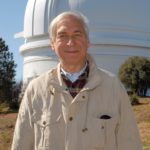|
«This Solar Eclipse and Others» (in English)» Jay Pasachoff (Williams College-Hopkins Observatory, Williamstown, Massachusetts, USA, and Chair, IAU Working Group on Solar Eclipses). Pasachoff is Field Memorial Professor of Astronomy at Williams College and the author of textbooks and tradebooks in astronomy, physics, mathematics, and other sciences.
He has taken a leading role in the science and history of transits of Mercury and Venus, as an analogue to exoplanet studies, leading up to the transit of Venus, and the 2016 and 2019 transits of Mercury. He is Chair of the Working Group on Eclipses of the IAU of the Sun and Heliosphere Division and of the Education, Outreach, and Heritage Division.He received the 2019 Klumpke-Roberts Award of the Astronomical Society of the Pacific «for his contributions to the public understanding and appreciation of astronomy», based in part on his role at the times of solar eclipses, when «Jay becomes astronomy’s cheerleader-in-chief, allowing more and more people to become interested and engaged in the field.»
WEDNESDAY – December 9
I will discuss the science and the magnificence of observing total solar eclipses, most recently the July 2, 2019, total solar eclipse that my team observed from Chile. Among the scientific problems being addressed at recent eclipses are motions in the solar corona, possible precursors to Sun-Earth space-weather events, the spectra from iron and argon that are so ionized that they have lost about half their normal electrons, the distribution of million+ kelvin gas in the corona, and how the corona is heated to a million kelvins or more. For outreach, I will discuss how to persuade the general public to travel into the zone of totality, and how to safely observe partial phases. I will discuss the 2017 and 2018 annular solar eclipses that I observed from Buenos Aires and Patagonia, Argentina, respectively, and the 2019 annular solar eclipses observed from India and elsewhere in Africa and Asia. I will prepare the scene for the December 14, total solar eclipse that my scientific team will observe from Las Grutas on the Atlantic Coast and for which the meeting will have an excursion. Acknowledgments: JMP’s |

